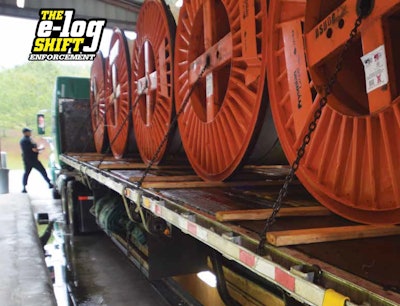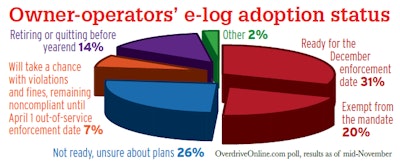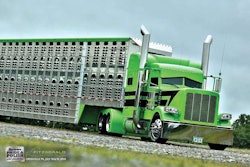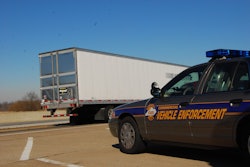
As of Dec. 18, states and their federal truck enforcement partners will begin issuing violations, citations and in some cases fines to those subject to the electronic logging mandate who aren’t using e-logs.
It’s anybody’s best guess as to how many truckers that includes, but Overdrive’s latest polling, conducted through mid-November, suggested it could well be a lot of truckers indeed. At that time, as illustrated in the poll results below, about a third of readers hadn’t prepared for mandate compliance and were unsure about their plans.
 In November, a slight majority of mostly owner-operator readers of Overdrive indicated they were fully prepared to be using e-logs at the Dec. 18 enforcement date of the ELD mandate, if they planned to keep on trucking. Of those who said they were prepared, though, about a third hadn’t begun using e-logs yet.
In November, a slight majority of mostly owner-operator readers of Overdrive indicated they were fully prepared to be using e-logs at the Dec. 18 enforcement date of the ELD mandate, if they planned to keep on trucking. Of those who said they were prepared, though, about a third hadn’t begun using e-logs yet.CarrierLists.com, around the same time as Overdrive’s polling was conducted, issued its own results from surveying the small fleets in its third-party carrier-procurement service for brokers and shippers. Among nearly 2,000 carriers operating one to 70 trucks, 60 percent of the fleets were not ELD-compliant. Surveys by other entities late in the year showed similar results.
Some of Overdrive’s survey respondents planned to deal with noncompliance consequences and hold off implementing until closer to April Fool’s Day. That’s when the Commercial Vehicle Safety Alliance’s out-of-service criteria calls for putting more teeth in punishment for not complying.

In recent weeks, FMCSA announced intentions to issue a 90-day enforcement delay for agricultural haulers, including but not limited to livestock operations. And the agency also signaled around the same time that ELD-related violations prior to April 1 would not be accompanied by severity weights to count toward carriers’ Compliance, Safety, Accountability system scores.
As for the question on many truckers’ minds – just how lenient inspectors might be in the early going – it’s likely to vary considerably from jurisdiction to jurisdiction, officer to officer. However, most state and federal law enforcement representatives are aware of the special cases that arise on the road, and some of them say that a standard of reasonableness is being encouraged in situations that unavoidably force truckers into violation.
And as many have remarked, the practices used with automatic onboard recording devices (AOBRDs, ELDs’ regulatory predecessors) will carry well into Phase 3 of the ELD rule’s implementation. What that means is likely heavy reliance by officers on reviewing hours of service information on the display of the devices themselves, or in some cases obtaining a printout from the device or an email direct to the officer.
Truckers using somewhat less-regulated AOBRDs today can continue using them in current form through the end of 2019, and newer ELDs make the graph-grid display of hours information a requirement. The grid is a form that inspectors are used to seeing, and Lt. Dan Wyrick of the Wyoming State Police adds that the new logs are “not the true tattletale” devices many drivers think they are.
Wyrick spoke with Overdrive after his participation in a series of “Train The Trainer” events around the nation in October and November, intended to roll out the Federal Motor Carrier Safety Administration’s long-awaited eRODS (electronic record of duty status) ELD analysis software to state enforcement. ELDs are required to be able to transmit log data to a central online housing for analysis by roadside enforcement who will use the software to make that analysis.
“It only tells you there may be something that is going on” in terms of an irregular situation or potential violation, Wyrick says. It essentially assists in analysis, minimizing the officer’s contact with the drivers’ devices. “AOBRDs today will pretty much do the same thing,” with the ability to fax or email current logs and previous seven days to officers. “It remains up to the individual inspector, then, to go through the inspection process on that.”
Wyrick notes a significant limitation of data transfers in states such as Wyoming where cellular data/internet coverage is spotty. “I don’t know that our current practices [with respect to checking drivers’ AOBRD logs] will change a whole lot” even with the eRODS rollout. For most stops, it’s likely “we’ll look at the display or print at the roadside” for many devices.
Collin Mooney, CVSA executive director, clarified what’s being delayed until April 1. “It’s not uncommon for government and the enforcement community to take a phased-in enforcement process” for the introduction of a major regulation, he says, referencing the CVSA board’s vote to delay enforcement of its ELD out-of-service criteria to April 1. But to operators thinking the delay equates to a carte blanche enforcement delay, “documenting the violation [on an inspection report], warnings, citations” and associated fines – “all that is on the table,” Mooney warns. “If you don’t know this is coming, you’ve had your head in the sand.”
The out-of-service delay, he says, at least will give the enforcement and regulatory communities “an indication of how many noncompliant carriers we’re going to have, truly. Some have said it’s more than half of the industry,” some much less. “Those are just wild guesses, in my view. We feel [the OOS delay] is a responsible approach to a new rule implementation. We’re not here to impede commerce, and the hours of service isn’t changing. There’s no reason we can’t have a reasonable phased-in enforcement approach.”
Asked whether most state departments would be ready to roll out the new central software to analyze ELD logs by Dec. 18 given the scant six-to-seven weeks between the first Train The Trainer event and the deadline, Mooney notes “we would have liked to have had it sooner, but we’re going to be OK.”
Wyrick, meanwhile, says much the same about enforcement in his state. Trainers were set to go out to “port-of-entry officers and troopers” the second full week of November to download the software to troopers’ and inspectors’ computers and school them on eRODS.
An FMCSA spokesman declined to comment on the schedule of its Train The Trainer events, saying anything having to do with enforcement training fell under the “enforcement tactics and methods” category of information and is “not releasable, even through a Freedom of Information Act request.”
The spokesman, however, reiterates the agency’s long-held line on the rule in general, inspite of narrow and not-so-narrow exemptions: full speed ahead. “FMCSA and its state and local enforcement partners likewise have been utilizing the past two years to plan and to prepare,” he says. “The enforcement training schedule remains precisely on track.”










